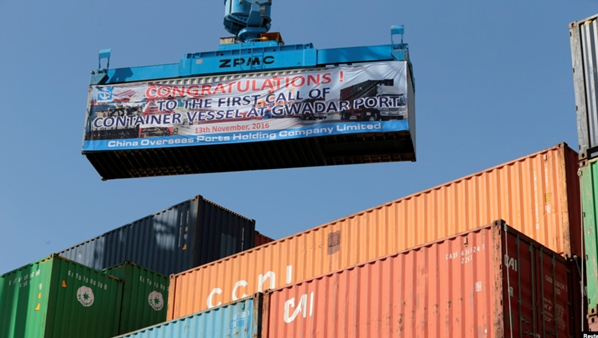Beijing Mixing Military, Commercial Interests Abroad: US Analysts

VOA report
Chinese investments in commercial ports and other infrastructure around the world could pave the way for the expansion of its military footprint, U.S. analysts warned at a recent event in Washington.
Chinese firms own or operate nearly 100 ocean ports in foreign jurisdictions, an analyst with the Carnegie Endowment for International Peace noted in a written statement provided to the U.S.-China Economic and Security Review Commission.
Chinese navy warships have docked at more than one-third of these facilities, Isaac B. Kardon told the bipartisan commission tasked with providing recommendations to Congress on China strategy.
Kardon, a senior fellow for China studies with Carnegie’s Asia Program and a former assistant professor at the U.S. Naval War College, further noted that China’s naval forces are utilizing the country’s trade-centric global infrastructure network “with growing scope and intensity to fulfill an increasingly global mission set.”
Chinese transportation and shipping conglomerates, including China Ocean Shipping Corp and China Merchants Group, Kardon wrote, have enabled a “globally distributed, vertically integrated transport and logistics network serving many of China’s international trade needs.”
While the primary functions of this network are “plainly commercial,” Kardon continued, “its secondary and tertiary functions, however, enable the PLA [People’s Liberation Army] to sustain a range of peacetime operations far from its shores.”
While American civilian labor force and production resources have been called to serve the nation’s needs in wartime, most notably during World War II, Chinese commercial entities appear to be ingrained in the country’s military buildup.
Law and policy “oblige PRC [People’s Republic of China] firms to give preferential access to PLA vessels [at] their terminals, share information, and actively support defense transportation and mobilization,” Kardon wrote in his prepared remarks for a January 26 hearing organized by the Economic and Security Review Commission.
Initiatives, interests intertwined
Jeffrey D. Becker, research program director for Indo-Pacific security affairs at the Center for Naval Analysis, used the example of Djibouti at the hearing to illustrate how China’s economic and military interests and initiatives are intertwined.
Economic activities by China’s state-owned enterprises — known as SOEs — at first preceded, and later continued alongside China’s growing military access in Djibouti, Becker testified. “By the time the PLA opened its first overseas base [in Djibouti] in 2017, China had [already] become [Djibouti’s] largest source of capital, providing roughly 40%, or roughly $1.4 billion, in funding for critical infrastructure investments,” Becker told the hearing.
Those investments, he pointed out, included the Ethiopia-Djibouti Railway, the Ethiopia-Djibouti Water Pipeline and the Doraleh Multipurpose Port.
“This pattern of leveraging economic investment as an anchor to support military engagement has appeared in other countries,” including the United Arab Emirates, Becker said, where the PLA reportedly has sought an increased military presence.
New tools, mechanisms
Becker also underscored that under Xi Jinping, Chinese authorities have established new mechanisms and tools to leverage more directly the capabilities of SOEs in support of PLA operations.
“This includes new legislation, which has helped to streamline the defense mobilization process and advance PRC’s goals of civil-military fusion,” he said at the hearing. The process for military requisition of civilian transportation assets, operating both domestically and abroad, got a boost with the passage of the Law of the People’s Republic of China on National Defense Transportation in 2016, he emphasized.
Besides the Chinese military’s ability to ride on the global expansion of Chinese infrastructure investment, some analysts noted at the hearing that since 2016, the number of senior Chinese military officials who traveled abroad and engaged with foreign counterparts has decreased, even as China has expanded military exercises in various parts of the world.
This decline, according to Phillip C. Saunders, director of the Center for the Study of Chinese Military Affairs at the U.S. National Defense University, “likely reflects tighter [Chinese Communist Party] control of the military.”
- From Voice of America (VOA)
-
Book Shelf
-
 Book Review
DESTINY OF A DYSFUNCTIONAL NUCLEAR STATE
Book Review
DESTINY OF A DYSFUNCTIONAL NUCLEAR STATE
- Book ReviewChina FO Presser Where is the fountainhead of jihad?
- Book ReviewNews Pak Syndrome bedevils Indo-Bangla ties
- Book Review Understanding Vedic Equality….: Book Review
- Book Review Buddhism Made Easy: Book Review
- Book ReviewNews Elegant Summary Of Krishnamurti’s teachings
- Book Review Review: Perspectives: The Timeless Way of Wisdom
- Book ReviewNews Rituals too a world of Rhythm
- Book Review Marx After Marxism
- Book Review John Updike’s Terrorist – a review
-
-
Recent Top Post
-
 CommentariesNews
Ides of trade between India and Pakistan
CommentariesNews
Ides of trade between India and Pakistan
-
 CommentariesTop Story
Palestinians at the cross- roads
CommentariesTop Story
Palestinians at the cross- roads
-
 Commentaries
While Modi professes concern for the jobless, “his government’s budget escalates class war”
Commentaries
While Modi professes concern for the jobless, “his government’s budget escalates class war”
-
 CommentariesNews
Politics of Mayhem: Narrative Slipping from Modi ….?
CommentariesNews
Politics of Mayhem: Narrative Slipping from Modi ….?
-
 Commentaries
Impasse over BRI Projects in Nepal
Commentaries
Impasse over BRI Projects in Nepal
-
 CommentariesNews
Yet another Musical Chairs in Kathmandu
CommentariesNews
Yet another Musical Chairs in Kathmandu
-
 CommentariesTop Story
Spurt in Anti-India Activities in Canada
CommentariesTop Story
Spurt in Anti-India Activities in Canada
-
 NewsTop Story
Nepal: Political Stability Under Threat Again
NewsTop Story
Nepal: Political Stability Under Threat Again
-
 NewsTop Story
Accountability Tryst With 2024 Ballot….
NewsTop Story
Accountability Tryst With 2024 Ballot….
-
 NewsTop Story
What Would “Total Victory” Mean in Gaza?
NewsTop Story
What Would “Total Victory” Mean in Gaza?
-
AdSense code



















